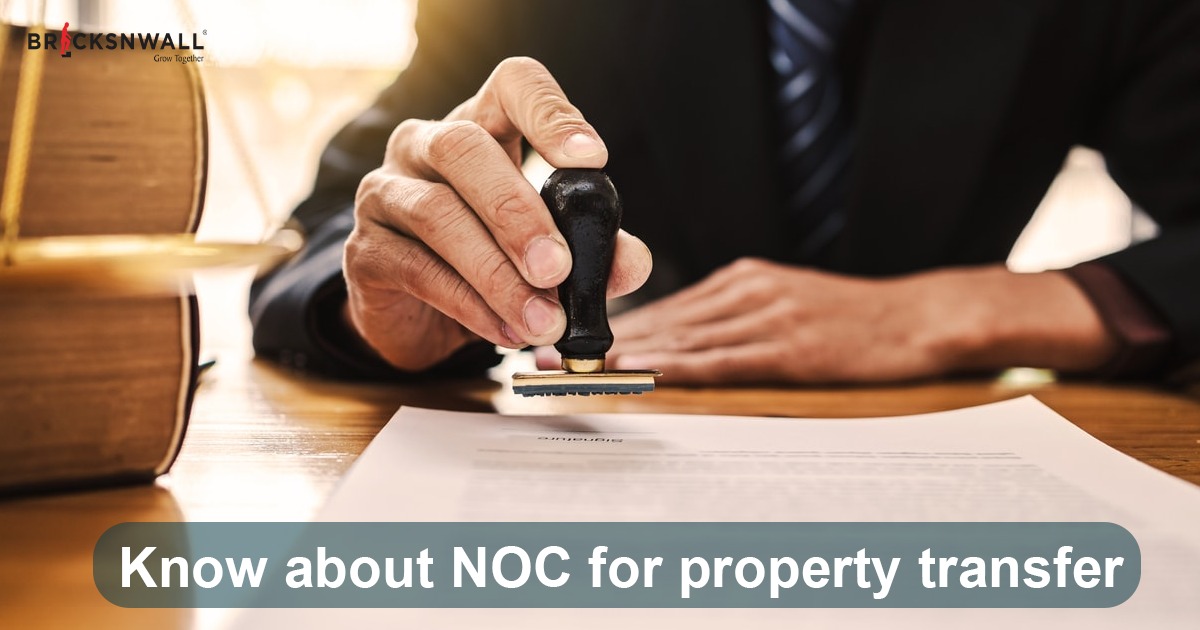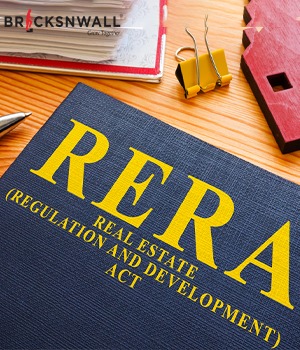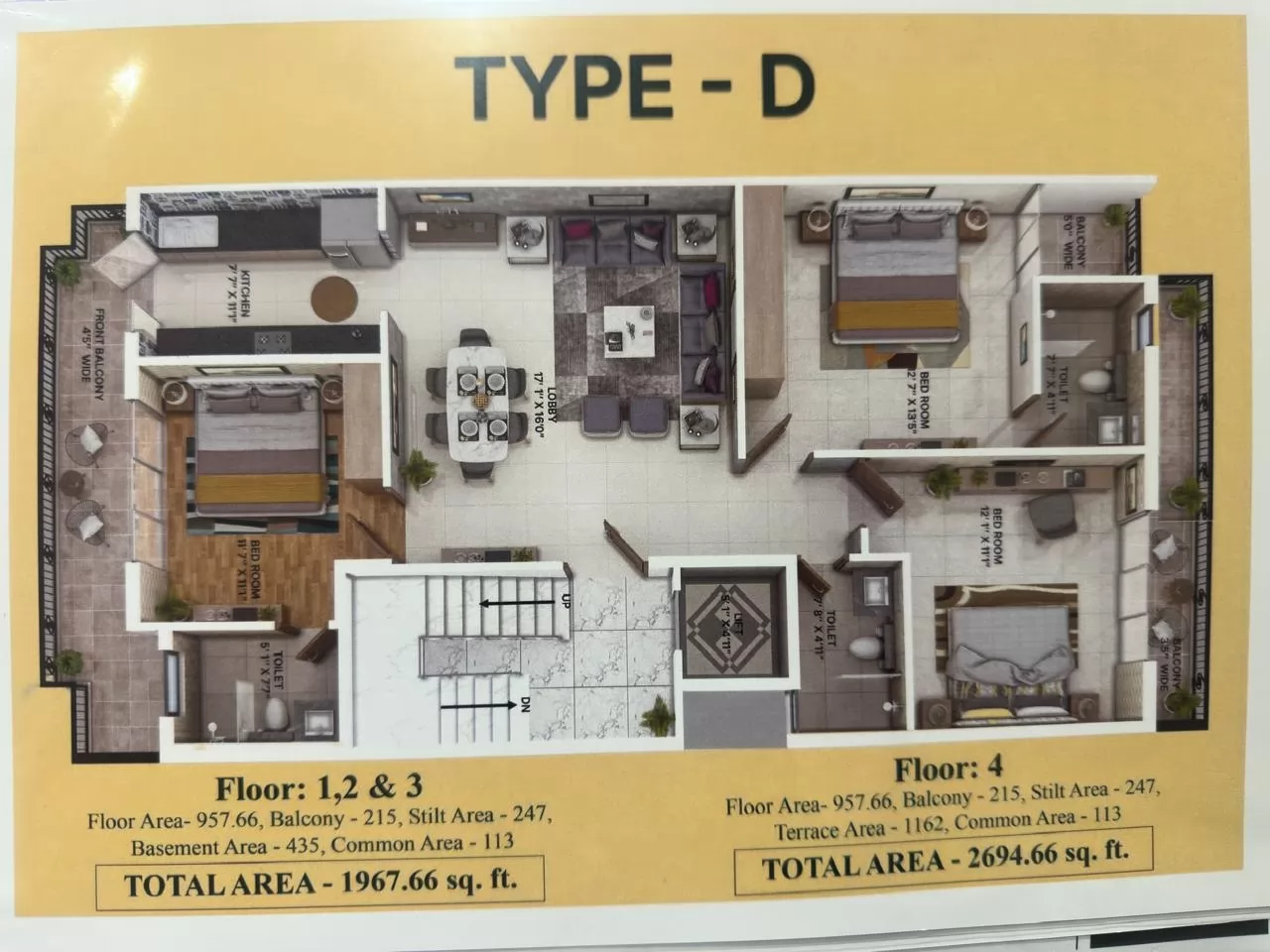Know about No Objection Certificate (NOC) for property transfer
Bricksnwall Trusted Experts

No Objection Certificate (NOC) for property
transfer is an important document in real estate transactions. This certificate
confirms that the transfer of property ownership is free of legal barriers and
concealed claims, and serves as approval from numerous authorities.
Understanding the complexities of acquiring a NOC
is critical for guaranteeing a smooth and transparent transaction, regardless
of whether you are buying or selling property. This blog delves into all you
need to know about No Objection Certificates for Property Transfers, giving
detailed information.
Importance of NOC in Property Transactions
The No Objection Certificate for Property Transfer
serves as a legal safeguard, offering clarity and security to all parties
engaged in the transaction. Continue reading for a detailed explanation of its
significance.
Legal Clearance
The NOC indicates that the property is free of any legal issues or objections from the existing owner, legal heirs, or other interested parties. This is critical for establishing clear and unambiguous ownership claim. Without this document, you may face unforeseen legal challenges that jeopardise your ownership rights, potentially leading to costly legal battles and financial pressure.
Regulatory Compliance
In real estate, particularly in big projects,
several No Objection Certificates for Property Transfer from various government
departments may be required to comply with municipal, state, and national
legislation. This compliance is crucial to avoiding any legal consequences that
may result from noncompliance with regulations.
Protecting Stakeholder Interests
It avoids future problems by confirming that all potential claims to the property have been resolved. This is especially significant in circumstances where the property may have several claimants, because the No Objection Certificate for Property Transfer ensures that the transaction will not be questioned subsequently.
What is the No Objection Certificate (NOC)?
The No Objection Certificate (NOC) is an important
legal document that indicates that there are no objections to the information
contained in the certificate. It has a wide range of applications, including
employment, business, and legal matters.
In the context of real estate, NOC is critical in confirming
that all parties involved, including government authorities, have no objections
to the intended activity or transfer of property, making it essential for
ensuring a smooth and genuine transaction.
When is a NOC required for a property transfer?
Understanding when a NOC is required can help
buyers and sellers navigate the legal intricacies of property transfer.
When selling or purchasing a property, sellers must get a No Objection Certificate from the necessary authorities to ensure there are no outstanding legal problems or financial liabilities, such as unpaid taxes or debts. This is critical for the buyer, who need confidence that the property is free of any liens before closing the sale.
When applying for a mortgage or loan
Financial institutions demand a No Objection
Certificate to confirm that the property does not have any outstanding loans or
legal disputes. This safeguards the lender's interests and ensures that the
property can be used as valid collateral for the loan.
Inheritance and succession
When a property is inherited or transferred through
succession, the legal heirs must provide a NOC. This helps to avoid future
disputes among heirs and provides a transparent transfer of ownership.
Construction & Development Projects
For developers, acquiring several NOCs from various
government authorities is required before beginning any construction or
development project. This not only legitimises the enterprise, but also shields
it from future legal challenges. Additionally,
It gives a good signal to home purchasers, lenders,
tenants, analysts, rating agencies, and all other stakeholders.
Failure to obtain the requisite NOCs can have serious implications, such as project delays, large fines, or even project stopping, resulting in financial losses and severe reputational harm.
How Do I Get a NOC for Property Transfer?
The steps in acquiring a No Objection Certificate
for property transfer are as follows: locate the issuing authority, apply for
the NOC, provide the appropriate papers, pay the necessary fees, verify the
NOC, and receive it.
Identification of the Issuing Authority
The first step is to determine the relevant issuing
authority, which differs according to the type of property being transferred.
For example:
(a) Flats or Apartments: The issuing authority may
be the housing society, Municipal Corporation, or the Revenue Department.
(b) Land or Plots: The issuing authority may be the
local land revenue officer or municipal authority.
Application for NOC
Ensure that the application is in the proper format
and that all details are correct. This may include information regarding the
property, the persons involved, and the rationale for the transfer. It is
critical to double-check all of the completed details to minimise errors that
could cause delays in the processing of the NOC.
Documents Required
Some of the common documents required to obtain a
No Objection Certificate for property transfer are:
1) Sale Deed
2) Encumbrance Certificate (EC)
3) Building approval plan.
4) No required certificate from the local
authorities.
5) Identity proofs for the buyer(s) and seller(s)
Payment of Fees
The fees for obtaining a NOC vary depending on the
type of property and issuing body.
Issue of NOC
Once the filed documents have been verified and costs have been paid, the authorities will issue the No Objection Certificate for Property Transfer. This certificate indicates that there are no outstanding disputes or payments relating to the property.
Step-by-Step Guide to Obtaining NOC for Property
Transfer.
For a more in-depth understanding, see our
step-by-step guide to acquiring your No Objection Certificate.
Step One: Draughting
Begin by writing the NOC in a Word document.
Include any essential information, such as the buyer and seller's
identification and pictures, income statements, and citizenship verification.
Step 2: Stamp paper
Purchase non-judicial e-stamp documents for ₹100 at
your local sub-registrar office, court, or cooperative bank. Provide all
required information, such as the document description (affidavit), first-party
name (applicant's name), contact number, and so on. The total cost is ₹110,
including processing costs (subject to change based on government standards).
Step 3: Print
Print the final NOC draft on non-judicial e-stamp
paper.
Step 4: Notary
Take the printed NOC and any required identifying
documents (such as a passport and Aadhaar card) to a notary public. Once the
notary has approved the NOC, sign the certificate. The notary will then seal
and record the NOC in the notary book. The notary service normally costs
roughly ₹50 (subject to change based on government requirements).
Cost and Time Invested in Obtaining a NOC
The cost of acquiring a NOC varies greatly based on
the state and local requirements where the property is located. The charge for
NOC typically ranges from ₹500 to ₹2,000. The application is processed by the
local revenue office, which checks all of the information submitted.
This process may take many days or weeks, depending on their protocols. It is best to consult your local authorities for the most current and up-to-date information on fees and processing times.
Common Challenges in Obtaining a NOC
Obtaining a No Objection Certificate (NOC) for
property transfer presents a number of obstacles. Here are some common
difficulties and solutions.
Bureaucratic Delays
The process of acquiring a NOC involves several
stages of verification and approval, which can be time-consuming. Depending on
the granting authority's workload and processes, you may face significant wait
times. To mitigate this, begin the application procedure as soon as possible
and follow up with the appropriate authorities on a frequent basis.
Incomplete or incorrect documentation
The application for NOC involves exact and complete
documents, such as identity verification, sale deeds, encumbrance
certifications, and no dues certificates. Any errors or omissions in these
documents may cause delays or even rejection of the application. To avoid this,
double-check all documents or contact a legal professional to verify they are
in order.
Navigating Multiple Authorities
In some circumstances, obtaining a No Objection
Certificate for Property Transfer necessitates interacting with many entities,
including the Regional Development Authority, Municipal Council, and Department
of Town Planning. Coordinating with numerous departments and obtaining the
necessary approvals can be a demanding undertaking. To address this problem,
consider receiving guidance from a professional who has experience with these
processes.
The Importance of Verifying NOC Authenticity
Verifying the legitimacy of the NOC is a proactive step that prevents delays in the property transfer process while also protecting both buyers and sellers from potential problems and financial losses. Failure to verify the NOC's legitimacy might result in serious legal ramifications, such as property ownership problems and even legal action.
Steps for Verifying NOC Authenticity
Check the Issuing Authority: Ensure that the NOC is issued by a legitimate and appropriate entity, such as the Regional Development entity, Municipal Council, or Housing Board.
Consult Legal Experts. Consult with legal
professionals or property lawyers to review and authenticate the NOC. Their
knowledge can assist you in identifying any errors or problems with the paper.
Direct Verification: Wherever possible, check the
NOC with the issuing authority. This may entail visiting their office or
examining internet databases, if available.
Latest News about NOC in Real Estate, India
In February 2024, the Punjab government repealed the state's required No Objection Certificate (NOC) requirement for property registration. This reform, which aims to reduce confusion and inconvenience, comes after years of varying regulations since the NOC was originally required in 2012. Chief Minister Bhagwant Mann stated that the NOC requirement resulted in substantial delays and issues for both urban and rural residents.
In conclusion
understanding the complexities of obtaining a No
Objection Certificate for property transfer is critical to ensuring a smooth
and legally compliant real estate transaction. This vital document serves
several functions, including legal clearance and regulatory compliance, as well
as stakeholder protection and loan transfer facilitation.
- A No Objection Certificate (NOC) is a legal document that confirms that there are no legal or financial issues with a property transfer. It is an important document in real estate transactions and is necessary in many scenarios.
- Determine the appropriate issuing authority for your property type (such as the housing society, municipal corporation, or revenue department). Submit a formal application together with all required documents, including the sale deed, encumbrance certificate, and identity verification. Pay the required funds and wait for the authority to check and issue the NOC after determining that there are no outstanding dues or legal issues with the property.
- A NOC for construction of a house stands for No Objection Certificate for building a house, and it is a legal document issued by the relevant authorities stating that they have no objection to the proposed construction on a specific plot of land, essentially granting permission to begin building a house there; it ensures compliance with local building regulations and prevents potential legal issues during construction.
- The body that gives a No Objection Certificate (NOC) for a property transfer is determined by the property's nature and location. Here are some authorities that can issue a NOC: Local Municipal Corporation, Revenue Department, Housing Society, Relevant land development authority, District Collector, Sub-registrar, Water and electric boards, Police







